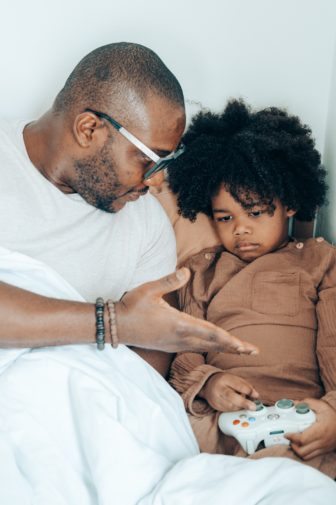
As a Black child, my parents gave me the “talk” when I was nine. This was rather old for the talk, as I had been raised in a loving, multicultural atmosphere near the old Memorial Stadium in Baltimore, Maryland. On one block, Indian culture resided across the street, the older couple down the street were Jewish, the young white and Asian interracial couple with their cute toddlers were two doors down. There was the older woman who came from North Dakota and eventually left to be with her younger daughter in West Virginia, and the single mother who left her kids to play and be raised by the neighborhood. They all formed the United Nations of my childhood.
The most shocking moments of my life have been more than just the possibility that someone would call me the N-word, which only happened once in the first 12 years of my life. Instead, the most shocking moment came when I was an adult. A while woman who had not seen me in ten years since graduation felt so familiar about my hairstyle to simply come up and touch it, to pull my hair. As in most cases, the very fake and insincere comment of “oh, how beautiful,” led to a millisecond pause before she simultaneously said “Can I touch it?” while simply going ahead and doing so.
She never waited for a response.

A Black father speaking to a child [Photo by Ketut Subiyanto from Pexels]
My reaction to her clearly shocked her, as though I should be honored and delighted that she found my hair so attractive, that her touching it was an irresistible and perfectly understandable reaction.
Now, for any one who is Black or a Person of Color, this is probably not a new experience. Add to the list parents of multi-racial children or anyone who has been fetishized as “exotic” or “rare” or “different.”
A no-no among nearly every Black woman I know is to dare to touch her hair without permission.
Why? Because it is a violation of a person’s body and dignity. It objectifies and fetishizes the individual without reason or cause. It disproportionately happens against persons of color, especially women. It leaves scars – emotional, spiritual, and psychological which may never fully heal.
In reality, there are more protests and outcries against touching a woman’s body without permission than there are against touching someone’s hair without their consent.
When speaking of sexual consent, there is no hesitation regarding its importance. Sex without consent falls into a number of categories including assault, rape, and molestation. As a society, several generations have been raised with the idea that consent involves active acknowledgement and affirmation of willingness to engage in sexual activity without being under the influence of alcohol, without being manipulated, and without being pressured by anyone.
Likewise, decisions around hair, its representation, and its role as a key part of the barrier system of the human body require consent. As a society, random touching by strangers is considered rude at best and criminal at worst when it comes to the overall physical body.
The C.R.O.W.N. Act, which stands for Creating a Respectful and Open World for Natural Hair passed in California in 2019. It attempts to rectify long-held workplace attitudes and favoritism towards Eurocentric models of beauty as being “acceptable” for the office as opposed to natural hairstyles and Afro-centric hairstyles as being “unkempt” or “unprofessional”. Despite its presence, there is a long way to go. The current Federal version of the C.R.O.W.N. Act has yet to pass the United States Senate even though it has passed the U.S. House of Representatives twice.
For each step backwards, there is a slight step forward.
One example that helped progress towards the eventual C.R.O.W.N Act was a 2013 article demonstrating how much beauty there is in putting hairstyles that are some times shunned on white women as an exploration of differences. Willow Smith’s video for “Whip My Hair” shows a variety of styles in a school setting. Common styles include twists, braids, Afro, box braids, dreadlocks, cornrows, crochet, but above all else, hair is one aspect of identity.
The shame and humiliation of having someone other than oneself decide whether one’s hair is appropriate whether conducting business, working in an office setting, or performing a sport is a form of subjugation that damages an individual’s psyche. The road to self-hatred begins with a lack of defense against improper behavior from the authority figures in a given space.

A group of Black children wearing their natural hairstyles [Pixabay]
In New Jersey, when a referee forced Andrew Johnson, a student wrestler, to cut his hair under duress or forfeit the match, then there is a step back. Questions are asked about how societal order regress to the point where no one intervenes. Millions watched the video, and even more commented about how it made them feel and how this was a clear racist act. Even when the situation is re-examined in an attempt to find answers or some redress, no one wins.
Another step back comes with the story of Nicole Pyles in Durham, North Carolina whose hairstyle was deemed unacceptable for softball. She was forced to cut her hair and beads or leave the game. While investigations and lawsuits may be filed, these are after the fact and not addressed in a timely manner. In these situations, children are publicly humiliated without regard to cultural, ethnic, religious, or racial sensitivity.
In the Durham, North Carolina, case, the school eventually sided with the student’s right to wear beads in her hair, and called the original policy “culturally biased and problematic“. In both cases, privilege invoked to violate another person’s space through requiring the cutting of hair stains the educational experience for these children and others who have experienced inhumane treatment by adults.
Only an honest, willing, and transparent acceptance of how cultural and racial bias in the area of beauty has caused trauma will help to mend the deep wounds experienced even today by many persons, especially those of African descent.
In February 2022, an open public apology by The Baltimore Sun to all Black Marylanders regarding its overall history as a newspaper was a step forward. Transparency, however late, can help to address past issues and attitudes. Journalistic publications have weight and carry great impact.
The Baltimore Sun founded in 1837 by Arunah S. Abell is not only a recognizable name in Maryland, but one of the oldest newspapers in the United States. Its motto throughout its 185 years remains “Light for All.”
Given this motto, The Baltimore Sun’s public acknowledgement of prejudice and its reaffirmation of the true job of journalism as the”Fourth Estate” set forth a challenge that it often ignored: “We at the paper have a public responsibility to confront and illuminate societal ills so that they can be addressed and eradicated.”
In everyday life, we use sources of light to make what is unseen or hidden visible. The willingness of a newspaper to confess to its flaws and the persistence of lawmakers to craft a bill that exposes biases in an attempt to heal long-standing emotional and psychological wounds – these are steps forward in the battle for true equality and reparation of past harms.
In some ways, the C.R.O.W.N. Act does just that in terms of what employers, educators, and society find acceptable for workers who choose to wear their hair naturally. This legislation sheds light through the dark window of racial and cultural divides in an attempt to educate and to heal those traumatized through being forced to choose between their school or work environment and their personal identity through hairstyle choices.
When children are told to cut their hair or sit out from educational opportunities, such as sports, they are denied the right to equal and full treatment under the law. They miss out on educational opportunities due to negative stereotypical attitudes towards natural and culturally traditional hairstyles.
The 1981 case, Rogers v. American Airlines highlights why the C.R.O.W.N. Act is needed. In that case, the court ruled in favor of an employer discriminating against a Black employee’s hairstyle. In siding with the airline, the court overlooked the cultural significance of hair styles and the ability to freely choose a hairstyle. In 2022, the United States is on the verge of enacting protective measures nationwide to accept natural hairstyles as a cultural and positive norm. The subsequent forty years made a difference.
While nearly seventy years has passed since the landmark Brown v. Board of Education (Topeka, KS) case, the attitudes that separate the races in the United States persist at a deeper level. How can equal opportunity and equal education be reached as a society when we still can force our children to feel shame or humiliation through active rejection of their basic right to wear their hair as they wish? It is not a matter of cleanliness, but one of cultural understanding and acceptance.
The goal of the C.R.O.W.N Act is to create a respectful and open world for natural hair. This is not a fight over the French Braid or hairstyles which are easily accepted, but rather the future for our children, our country, and our society. This is not simply an internal matter for the United States of America; there are other countries in the world, such as Canada where bias against natural hairstyles affects employment and educational opportunities.
While much work remains to be done, each state that passes the C.R.O.W.N. Act begins to reduce the perception that hair choices by persons of color are unacceptable. It starts to lower the continued objectification of bodies of color as having little to no worth, and the fetishization of their hair choices in particular. Finally, the best outcome of passing the C.R.O.W.N Act is a renewed sense of hope that the future eventually will be a more equitable playing field for people of color in general.
THE WILD HUNT ALWAYS WELCOMES GUEST SUBMISSIONS. PLEASE SEND PITCHES TO ERIC@WILDHUNT.ORG.
THE VIEWS AND OPINIONS EXPRESSED BY OUR DIVERSE PANEL OF COLUMNISTS AND GUEST WRITERS REPRESENT THE MANY DIVERGING PERSPECTIVES HELD WITHIN THE GLOBAL PAGAN, HEATHEN AND POLYTHEIST COMMUNITIES, BUT DO NOT NECESSARILY REFLECT THE VIEWS OF THE WILD HUNT INC. OR ITS MANAGEMENT.
The Wild Hunt is not responsible for links to external content.
To join a conversation on this post:
Visit our The Wild Hunt subreddit! Point your favorite browser to https://www.reddit.com/r/The_Wild_Hunt_News/, then click “JOIN”. Make sure to click the bell, too, to be notified of new articles posted to our subreddit.
How does a person’s hair even remotely relate to a wrestling match or a softball game? How dare someone force another, in that moment, to cut off their hair? The rudeness, ignorance and entitlement of some people is still shocking to me. I’m so sorry for all the folks who have been treated in this way and will pay more attention to what goes on around me relating to that so I can intervene if needed.